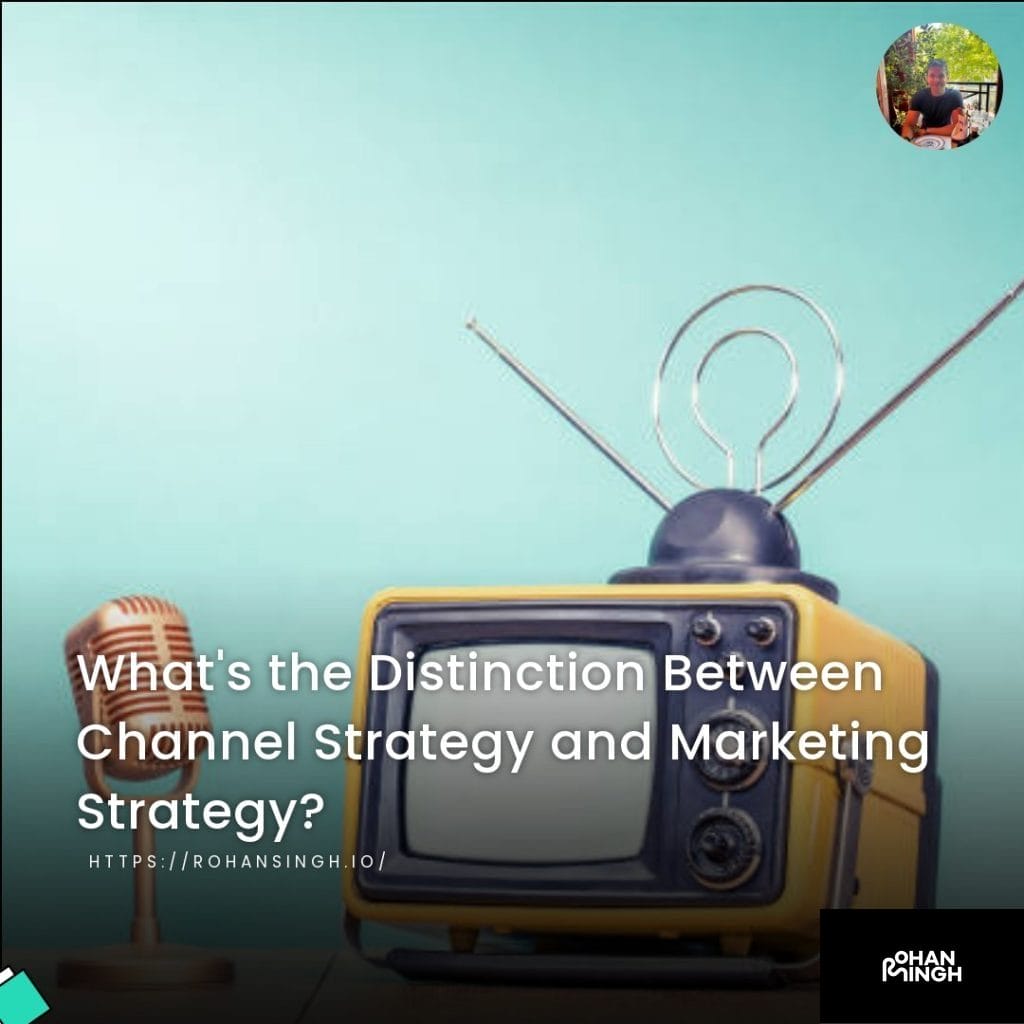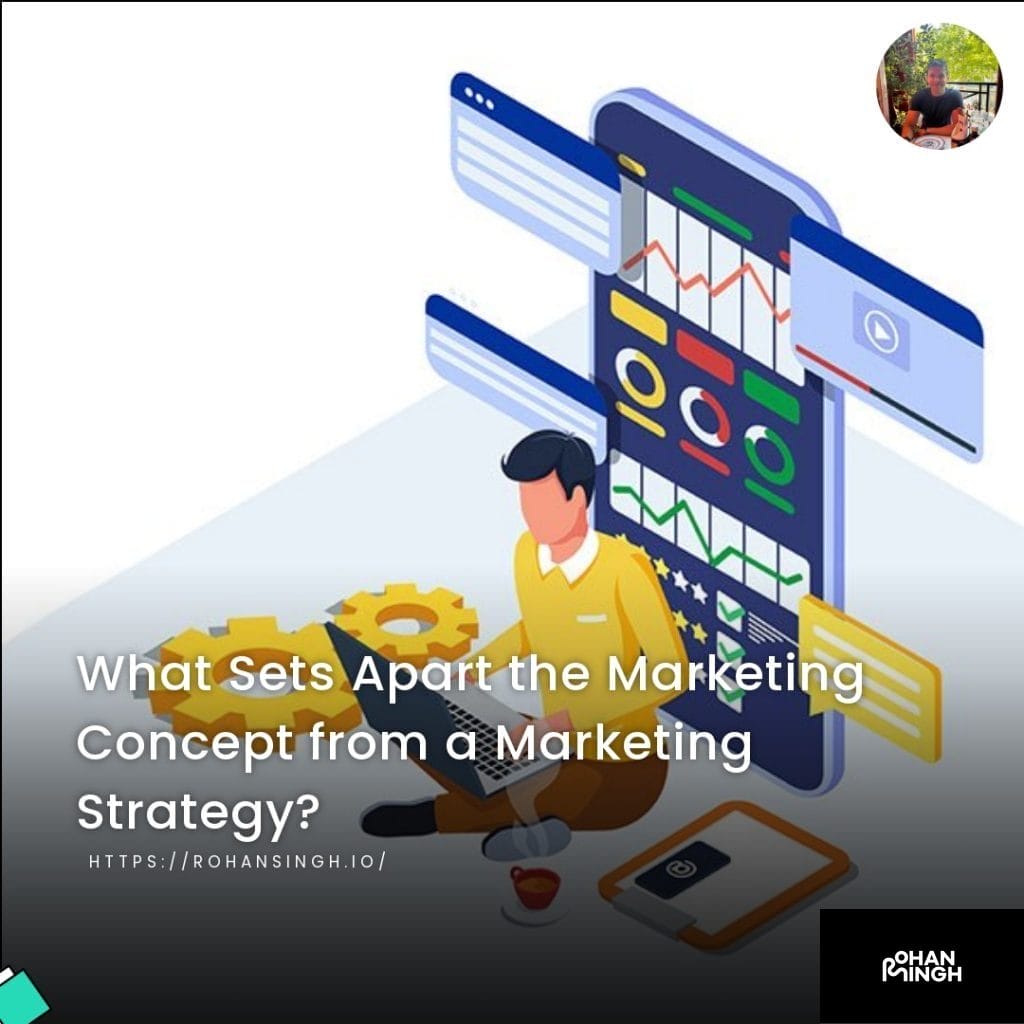What’s the Distinction Between Channel Strategy and Marketing Strategy?

What is Channel Strategy?
Channel strategy refers to the plan and approach that businesses use to reach their target market and customers through various channels. It involves determining which marketing and distribution channels will be most effective in reaching potential customers and delivering value to them. A successful channel strategy focuses on understanding customer preferences, identifying the most effective channels to reach them, and creating a seamless customer experience across those channels.
Table of Contents
ToggleIn today’s multi-channel world, businesses have a plethora of channels to choose from, including digital channels like websites, social media platforms, and mobile marketing, as well as traditional channels such as direct mail and physical retail locations. A well-defined channel strategy takes into account the target audience’s preferences and behavior, considering factors such as where they spend their time and how they prefer to interact with brands.
A comprehensive channel strategy also considers how different channels can work together to enhance the overall marketing efforts. For example, businesses can leverage content marketing to attract potential customers and then use email campaigns to nurture them throughout the customer journey. By aligning marketing channels with customer preferences and needs, businesses can create a more targeted and effective marketing strategy that drives customer acquisition, engagement, and loyalty.
What is Marketing Strategy?
A marketing strategy is a comprehensive plan that outlines an organization’s overall approach to reaching its target audience and achieving its marketing goals. It involves analyzing the target market, understanding customer preferences and behaviors, identifying key marketing channels, and developing tactics to effectively promote products or services.
Unlike marketing management, which focuses on the day-to-day execution of marketing activities, marketing strategy sets the overarching direction and guides the allocation of resources. It provides a roadmap for the entire organization to follow and ensures that all marketing efforts are aligned toward a common goal.
Having a solid marketing strategy in place is crucial for businesses of all sizes. It helps in maximizing the effectiveness of marketing efforts by providing a clear direction and focus. By defining specific goals and outcomes, marketing strategy enables companies to measure their success and make informed decisions about resource allocation. It also helps in identifying opportunities, understanding customer needs, and crafting targeted marketing messages. Without a well-defined marketing strategy, businesses may struggle to differentiate themselves from competitors and may find it challenging to attract and retain customers.
Let's talk about your future project!
Eager to collaborate on your upcoming endeavor? Let's explore and ignite the potential of your next big idea, shaping a promising future together!
The Basics of Channel Strategy
A well-defined channel strategy is crucial for businesses looking to effectively reach and engage with their target audience. It is a plan that outlines the various distribution channels through which a company’s products or services will be brought to market. A channel strategy takes into consideration factors such as customer preferences, market trends, and competition to determine the most effective channels to reach and serve potential customers.
By analyzing market research and understanding the target market, businesses can develop a channel strategy that aligns with their overall marketing objectives. This strategy may involve a combination of both direct and indirect channels, depending on the nature of the products or services being offered. Direct channels involve selling directly to customers without intermediaries, while indirect channels involve the use of intermediaries such as distributors, retailers, or online marketplaces.
A well-executed channel strategy ensures that the right product is available at the right place and time for the target customer. For example, imagine a company that manufactures high-end kitchen appliances. To effectively reach their target customers, they may choose to sell their products through a combination of direct sales through their website and also through partnering with reputable retail stores. This multi-channel approach increases their reach and provides more convenience for potential customers. Additionally, by partnering with retailers, they can tap into their existing customer base and benefit from their established distribution network. A thoughtful channel strategy allows businesses to maximize their reach and sales potential, ultimately driving growth and success.

Definition of Channel Strategy
A channel strategy is a crucial component of a company’s overall marketing plan. It defines how the business will distribute its products or services to reach the target audience effectively. In simpler terms, it is the plan of action through which businesses make their offerings available to the end user.
The importance of a channel strategy cannot be overstated. It ensures that companies are leveraging the most appropriate and effective distribution channels to reach their target audience. By carefully analyzing customer preferences, market trends, and the competitive landscape, businesses can identify the best channels to utilize.
Having an effective channel strategy offers several benefits. Firstly, it can lead to reduced costs by optimizing the distribution process, minimizing wastage, and streamlining logistics. Secondly, it provides a competitive advantage by enabling businesses to reach potential customers more efficiently than their competitors. Lastly, an effective channel strategy ensures that maximum value is delivered to customers by providing convenient access to products or services.
Amazon is a prime example of a company that has successfully implemented a channel strategy. By leveraging its vast online marketplace and utilizing various distribution channels, Amazon has been able to reach a global customer base. Their wide range of products, efficient delivery network, and user-friendly shopping experience have made them a dominant player in the e-commerce industry. This success can be attributed to their well-executed channel strategy, which has allowed them to deliver maximum value to customers while maintaining a competitive edge.
Goals of a Channel Strategy
The primary goal of a channel strategy is to expose a company’s products or services to potential customers. It is all about ensuring that the right message reaches the right audience through the most effective and efficient distribution channels. By understanding the target market and customer preferences, companies can design a channel strategy that maximizes their reach and visibility.
A well-defined channel strategy helps businesses achieve their marketing objectives by providing a roadmap for how they will connect with their target market. Whether it’s through online channels such as social media platforms or traditional channels like direct mail, businesses can choose the most appropriate channels to reach their desired audience. The goals of a channel strategy could vary depending on the company’s specific objectives. For some, it might be to increase brand awareness and reach new customers, while for others, it might be to drive sales and increase customer retention.
Ultimately, the goal of a channel strategy is to create a seamless customer experience, ensuring that the right message is delivered to the right customer at the right time. By understanding the target market and their channel preferences, businesses can leverage various channels to engage and convert potential customers, thereby driving growth and success.
Elements of a Channel Strategy
When developing a channel strategy, companies consider several key elements to ensure effective exposure of their products or services to potential customers. The first element is understanding the target market and its preferences. By identifying the characteristics, needs, and behaviors of potential customers, companies can tailor their channel strategies to reach them more effectively. This involves conducting market research, analyzing customer data, and staying updated on current trends.
Another important element is choosing the appropriate channels to reach the target market. Companies can utilize various channels such as web sales, retail sales, value-added resellers, and systems integrators. Web sales involve selling products or services directly to customers online through websites or e-commerce platforms. Retail sales refer to distributing products through physical stores or third-party retail partners. Value-added resellers are third-party companies that package a company’s product or service with additional features or services. Systems integrators help companies integrate various technologies and systems to provide a seamless customer experience.
By analyzing the target market and considering the different channel options available, companies can select the most suitable approach for their channel strategy. This allows them to maximize the exposure of their products or services to potential customers and increase their chances of success. Ultimately, the key elements of a channel strategy revolve around understanding the target market, selecting the right channels, and optimizing the distribution process to expose products to potential customers in the most effective way possible.

Types of Channels Used in a Channel Strategy
When developing a channel strategy, it is essential to consider the various types of channels that can be utilized to reach the target market effectively. These channels serve as the vehicles through which marketing messages are delivered to potential customers. Some common types of channels used in a channel strategy include email, social media platforms, websites, content marketing, and direct mail.
Email campaigns are a popular channel choice as they allow companies to directly communicate with potential customers. With personalized and targeted email marketing strategies, companies can reach their audience directly in their inboxes, delivering relevant and timely messages. Similarly, social media platforms have become powerful channels for marketing. With the ability to reach a vast audience and engage with potential customers through platforms like Facebook, Instagram, and Twitter, companies can build brand awareness, foster customer relationships, and drive traffic to their websites.
Websites are crucial channels that serve as digital storefronts for companies. By optimizing their websites for search engines and providing valuable content, companies can attract potential customers and convert them into paying customers. Content marketing is another channel strategy where companies create and distribute valuable and relevant content to attract and engage with their target audience. By sharing valuable information through blog posts, videos, and other formats, companies can establish themselves as thought leaders in their industry.
Lastly, even with the rise of digital marketing, direct mail remains a viable channel for reaching potential customers. By sending physical mailers and catalogs, companies can stand out in a crowded digital space and connect with customers more tangibly.
In conclusion, when developing a channel strategy, it is crucial to consider the types of channels that can effectively deliver marketing messages to the target market. Email, social media platforms, websites, content marketing, and direct mail all play significant roles in reaching and engaging potential customers. By utilizing a mix of these channels, companies can create a cohesive and multi-faceted marketing strategy that maximizes their reach and impact.
The Basics of Marketing Strategies
Marketing strategies are crucial for businesses to achieve their goals and drive growth. They provide a roadmap for companies to effectively promote their products or services and connect with their target audience. A well-crafted marketing strategy takes into account the company’s overall business objectives, target market, customer preferences, and competitive landscape. It outlines the key tactics and channels that will be used to reach and engage potential customers.
Marketing strategies differ from marketing channels in their scope and focus. While a marketing strategy is a comprehensive plan that encompasses various elements of the marketing mix, including product, price, promotion, and distribution, marketing channels refer to the specific channels or platforms through which a company delivers its marketing message to the target audience. Channels can include email campaigns, social media platforms, websites, direct mail, and more.
To illustrate the difference, consider this example: a company’s marketing strategy may include targeting millennial consumers, offering competitive pricing, and positioning their product as eco-friendly. On the other hand, their marketing channels may include utilizing social media platforms like Instagram and TikTok to engage younger audiences, partnering with influencers to promote their product, and leveraging their website to provide detailed product information and facilitate online sales.
In summary, marketing strategies provide the overall direction and approach for a company’s marketing efforts, while marketing channels are the specific platforms or channels through which the marketing message is delivered. Both are essential components of a company’s overall marketing plan and must work in harmony to effectively reach and engage the target audience.
Definition of Marketing Strategies
Marketing strategies are the backbone of a company’s approach to promoting and selling its products or services. They encompass every aspect of the business’s plan for attracting and retaining customers. While marketing channels play a crucial role in reaching the target audience, marketing strategies are more comprehensive and detailed.
A marketing strategy is like a roadmap that guides the company’s marketing efforts. It outlines the steps and actions needed to achieve the desired business goals. It includes elements such as identifying the target audience, defining the unique selling proposition (USP), crafting brand messaging, and determining the most effective marketing channels to reach the audience.
A well-defined marketing strategy goes beyond simply listing the marketing channels to be used. It dives into understanding the target audience’s needs, preferences, and behaviors. It also considers the competition and market trends to create a compelling and differentiated customer experience. By incorporating USP and brand messaging into the marketing strategy, businesses can create a clear and consistent message that resonates with their target audience.
Ultimately, marketing strategies provide a framework for businesses to align their marketing efforts with their overall business plan. They are the foundation upon which successful marketing campaigns are built and help businesses stand out in a crowded marketplace.

Goals of a Marketing Strategies
The primary goal of a marketing strategy is to help businesses effectively reach their target market and convert them into loyal customers. A well-crafted marketing strategy takes into account the specific goals and objectives of the business and outlines the steps needed to achieve them. It not only identifies the target market but also delves deeper to understand their needs, preferences, and behaviors. By gaining insights into the target market, businesses can customize their marketing messages and tactics to effectively engage and convert potential customers.
One of the main goals of a marketing strategy is to increase brand awareness and visibility. By strategically positioning the business in front of its target market through various marketing channels, businesses can create awareness and generate interest among potential customers. Another important goal is to drive customer acquisition and generate leads. The marketing strategy should outline tactics and strategies to attract new customers and convert them into paying customers.
In addition to customer acquisition, a marketing strategy also aims to retain and engage existing customers. This can be achieved through targeted marketing campaigns and personalized messaging that cater to the unique needs and preferences of current customers. Ultimately, the ultimate goal of a marketing strategy is to increase revenue and achieve sustainable business growth by effectively reaching the target market and converting them into loyal customers.
Elements of a Marketing Strategies
Key elements that should be included in a marketing strategy are crucial for its success. First and foremost, identifying the target audience is essential. Understanding who the ideal customer is and their preferences, needs, and pain points allow businesses to tailor their marketing efforts accordingly. This enables them to effectively engage with potential customers and build a connection.
Another key element is determining the unique selling proposition (USP) of the product or service. This is what sets the business apart from its competitors and demonstrates the value it offers to customers. By identifying the USP, businesses can create compelling brand messaging that highlights the benefits and advantages of choosing their product or service.
Choosing the right marketing channels is also crucial. There are various channels available, such as social media platforms, email campaigns, content marketing, and even direct mail. Selecting the appropriate channels that align with the target audience’s preferences and behavior ensures that the marketing messages reach them in the most effective way possible. It’s important to remember that different channels may work differently for different businesses, so careful consideration is necessary.
Overall, the key elements of a marketing strategy – from understanding the target audience and identifying the USP to crafting compelling brand messaging and selecting the appropriate marketing channels – all contribute to creating a solid foundation for a successful marketing campaign. By incorporating these elements, businesses can position themselves strategically in the market, connect with their desired audience, and achieve their marketing goals.
Types of Channels Used in Marketing Strategies
When it comes to marketing strategies, there are several types of channels that businesses can utilize to reach and convince their target customers. These channels serve as avenues to connect with potential buyers and showcase the value of their products or services. One popular channel is email marketing, which allows businesses to directly communicate with individuals who have shown interest or signed up for their newsletters. With personalized and targeted messages, businesses can convince these potential customers of the benefits of their offerings and compel them to make a purchase.
Social media is another powerful channel that has revolutionized the way brands communicate with their target audience. With billions of users worldwide, platforms like Facebook, Instagram, and Twitter provide businesses with an opportunity to engage their audience through compelling visuals, entertaining content, and interactive features. By building a strong social media presence and establishing a genuine connection with users, businesses can effectively convince their target customers to choose their products or services.
In addition to email marketing and social media, other channels commonly used in marketing strategies include content marketing, search engine marketing, influencer marketing, and traditional advertising channels such as television, radio, and print media. Each of these channels opens up unique ways to convince target customers by delivering tailored messages that resonate with their needs and preferences. By understanding the strengths and nuances of each channel, businesses can strategically select the ones that align with their target audience and maximize their marketing efforts.

Comparing and Contrasting Channel Strategies and Marketing Strategies
When it comes to business growth and reaching potential customers, understanding the difference between channel strategies and marketing strategies is crucial. While they may seem similar, these two concepts have distinct roles in a company’s overall growth strategy.
A marketing strategy refers to the overarching plan that outlines the company’s approach to reaching and engaging with its target market. It involves defining the target audience, understanding their preferences, and creating marketing messages that resonate with them. A solid marketing strategy encompasses various elements, including branding, market research, advertising, and promotional campaigns. The goal of a marketing strategy is to create awareness, generate leads, and ultimately convert those leads into sales.
On the other hand, channel strategy focuses on the distribution and delivery of products or services to potential customers. It involves identifying and selecting the most effective channels through which the products can reach the target audience. These channels can include direct channels such as the company’s website or physical stores, as well as indirect channels like distributors, resellers, or online marketplaces. The channel strategy aims to optimize the distribution process, ensuring that products are available to customers at the right time and in the most convenient way possible.
To illustrate the distinction between the two strategies, consider the example of Amazon. Amazon’s marketing strategy revolves around creating a seamless customer experience, utilizing personalized recommendations, targeted advertising, and exceptional customer service. Their marketing efforts focus on building trust and loyalty among their target customers. However, Amazon’s channel strategy is equally impressive. They have mastered the art of multi-channel marketing, offering customers various options to purchase their products, whether through their website, mobile app, or voice-assistant devices. Their channel strategy is designed to provide convenience and accessibility to customers, ensuring that they can easily find and purchase what they need.
In conclusion, while marketing strategy and channel strategy are interrelated, they serve different purposes in a company’s growth journey. Understanding the distinction between the two allows businesses to have a holistic approach to reaching their target customers, both by creating effective marketing messages and optimizing the distribution channels through which customers can access their products or services. By aligning these two strategies harmoniously, businesses can maximize their chances of success in the competitive market.
Similarities between the Two Strategies
While marketing management and marketing strategy are two distinct concepts, there are several similarities between the two that are worth highlighting. Both marketing management and marketing strategy share the common goal of achieving marketing objectives and driving business growth. They are both essential components of a company’s overall marketing efforts and work hand in hand to guide the organization toward success.
In terms of goals, marketing management aims to effectively plan, organize, and control all marketing activities within a company. It encompasses tasks such as market research, product development, pricing strategies, and promotional campaigns. Similarly, marketing strategy focuses on developing a comprehensive plan that outlines how the company will reach its target audience, differentiate itself from competitors, and achieve its marketing goals.
Moreover, both marketing management and marketing strategy rely on similar concepts and principles. They both emphasize the importance of understanding the target market, identifying customer preferences, and creating messages that resonate with the intended audience. Additionally, both strategies stress the significance of monitoring and analyzing marketing performance, adjusting strategies based on market trends and customer insights.
In conclusion, while marketing management and marketing strategy are distinct concepts, they share common goals, concepts, and components. Both strategies are essential for driving business growth and achieving marketing objectives. By effectively managing marketing activities and developing a well-defined marketing strategy, businesses can maximize their marketing efforts and successfully reach their target audience.
Differences between the Two Strategies
Marketing strategy and marketing plan are two distinct concepts in the realm of marketing management. While they are interrelated, it is important to understand the main differences between the two, as they serve different purposes and have different scopes.
A marketing strategy is a high-level plan that outlines the overall approach and direction a company will take to achieve its marketing goals. It takes into account long-term trends, market conditions, and customer preferences. The main purpose of a marketing strategy is to attract and retain the target audience by positioning the company in a way that differentiates it from competitors. It is a comprehensive blueprint that guides all marketing activities and provides guidance on factors such as product development, pricing strategies, and distribution channels. A marketing strategy focuses on the bigger picture and sets the foundation for the company’s marketing efforts.
On the other hand, a marketing plan is a more tactical and detailed document that outlines specific actions and initiatives to promote a particular product or service. It is more short-term in nature and hones in on the specific steps and resources required to outshine competitors and achieve specific marketing objectives. A marketing plan includes details about the target market, marketing channels to be utilized, marketing messages, and specific timelines and budgets. It is a more focused and executable plan that helps marketing teams execute the broader marketing strategy effectively.
In summary, while a marketing strategy sets the overall approach and direction, a marketing plan dives deeper into the tactical aspects and provides detailed guidance on how to achieve specific marketing objectives. Both strategies are crucial for a company’s success, as they work together to ensure a cohesive and effective marketing approach.

Final Thoughts
In conclusion, while both marketing strategy and channel strategy are crucial components of a company’s overall marketing plan, they serve distinct purposes and require careful consideration. A marketing strategy sets the tone and direction for all marketing activities, focusing on attracting and retaining the target audience by differentiating the company from its competitors. On the other hand, a channel strategy determines the most effective and efficient ways to reach and engage with the target market, utilizing various marketing channels and tactics.
Businesses need to recognize the significance of both strategies and understand how they can work together synergistically. A well-crafted marketing strategy informs the development of a channel strategy, ensuring that the chosen marketing channels align with the overall goals and objectives. By integrating the two strategies, companies can create a seamless customer experience across multiple touchpoints and maximize their marketing efforts.
Ultimately, businesses should strive to find the right balance between a comprehensive marketing strategy and an effective channel strategy. This involves continuous testing, analyzing customer preferences, and staying updated on the latest marketing trends and tools. By consistently refining and optimizing these strategies, companies can position themselves for success in an increasingly competitive marketplace.
FAQs
What is the difference between a marketing strategy and a channel strategy?
A marketing strategy is a comprehensive plan that outlines the overall marketing approach, focusing on attracting and retaining the target audience. It includes tactics such as content marketing, email campaigns, and social media marketing, which are used to promote products or services and differentiate the company from competitors. On the other hand, a channel strategy focuses on the most effective and efficient ways to reach and engage with the target market. It involves selecting and managing the distribution channels, such as direct sales, online marketplaces, or retail partnerships, that will be used to deliver the marketing messages. While a marketing strategy guides all marketing activities, a channel strategy specifically determines the best channels to use for reaching the target customers.
How do a marketing strategy and a channel strategy work together?
While a marketing strategy and a channel strategy serve different purposes, they are closely interconnected. A well-crafted marketing strategy informs the development of a channel strategy by determining the target audience, customer preferences, and marketing messages. The channel strategy then selects the most appropriate marketing channels to effectively reach and engage with the target customers. By integrating the two strategies, companies can create a seamless customer experience across multiple touchpoints.
Is channel strategy important in an online marketplace like Amazon?
Yes, channel strategy is crucial in an online marketplace like Amazon. With millions of customers and countless products available, having a strong channel strategy can help businesses stand out from the competition and reach their target customers effectively. Companies need to consider various factors like product placement, pricing, and customer reviews to optimize their presence on the platform. Additionally, they can leverage Amazon’s advertising tools, like sponsored products or display ads, to increase visibility and drive sales.
Overall, while there are differences between marketing strategy and channel strategy, both are essential for businesses to successfully reach and engage with their target customers. A well-thought-out marketing strategy sets the direction for all marketing activities, while a well-executed channel strategy determines the best channels to deliver the marketing messages. By understanding the similarities and leveraging the synergies between the two, companies can maximize their marketing efforts and create a compelling customer experience.
What Is Channel Strategy?
Channel strategy refers to the comprehensive plan that a company develops to determine the most effective and efficient ways in which to distribute its products or services to the end customer. It is a key component of the overall marketing strategy, as it focuses specifically on the movement of the product or service through the chain of commerce.
A channel strategy involves identifying and managing the various distribution channels that will be used to deliver the product or service to the target market. These channels can be direct, where the company sells directly to the end customer, or indirect, where intermediaries are involved in the distribution process.
The primary functions of channels are to facilitate the exchange of goods or services and to provide value-added services to enhance the customer experience. For example, a direct channel could involve a manufacturer selling its products directly to consumers through an online store or physical retail outlets. On the other hand, an indirect channel could involve the use of wholesalers, distributors, or retailers to reach the end customer. Companies may choose to leverage both direct and indirect channels to maximize reach and accessibility to their target customers.
In essence, a channel strategy is about finding the most efficient and effective ways to bring the product or service to the end customer. It involves careful consideration of factors such as customer preferences, distribution costs, and market reach, to ensure a seamless customer experience and ultimately drive sales.
How a Marketing Channel Strategy Can Maximize Your Campaigns?
A well-executed marketing channel strategy can be a game-changer for your campaigns. By identifying the right channels to reach your target audience, you can create a consistent branded experience that captures their attention and drives them to take action. Whether it’s through social media platforms, email campaigns, or direct mail, your marketing channel strategy allows you to engage potential customers where they are most likely to be receptive to your message.
One of the key benefits of engaging potential customers on the right channels is that it increases the likelihood of conversion. When you reach your target audience on platforms they are already active on, you have a better chance of capturing their interest and driving them to make a purchase. By tailoring your marketing efforts to align with customer preferences and behaviors, you can create a seamless experience that builds trust and encourages them to take the desired action.
Additionally, a well-planned marketing channel strategy can enhance your brand’s visibility and credibility. When you consistently deliver your marketing messages through the right channels, you establish a strong presence in the minds of your potential customers. This heightened visibility helps you stay top of mind, making it more likely for them to choose your product or service when the need arises. By creating a consistent branded experience across different channels, you also demonstrate professionalism and reliability, fostering a sense of trust and loyalty among your audience.
In today’s competitive landscape, a strategic marketing channel strategy can give you a significant advantage. By identifying the channels that resonate with your target audience and consistently delivering a branded experience, you maximize the impact of your campaigns and increase the likelihood of converting potential customers into loyal, satisfied customers.
What Is a Marketing Strategy?
A marketing strategy is an essential component of any successful business, especially in the world of Knowledge Commerce. It serves as a blueprint for reaching the target market and achieving business goals. This strategy outlines the approach and tactics that will be employed to attract, engage, and convert potential customers into loyal clients.
In the context of Knowledge Commerce, where information and expertise are monetized, a well-defined marketing strategy is crucial. It helps businesses establish themselves as authorities in their niche by positioning their offerings in a way that resonates with their target market. By identifying the unique selling proposition (USP) of their products or services, businesses can differentiate themselves from the competition and effectively communicate the value they provide.
Another key element of a marketing strategy is brand messaging. This involves crafting a compelling story and consistent message that speaks directly to the needs and aspirations of the target audience. By understanding their pain points and desires, businesses can tailor their marketing efforts to address these concerns and position themselves as the go-to solution.
Overall, a marketing strategy acts as a guiding light for businesses in the Knowledge Commerce industry. It helps them identify their target market, define their business objectives, and implement the most effective tactics to achieve those goals. With a solid marketing strategy in place, businesses can amplify their reach, generate leads, and ultimately drive revenue.
Why Does Your Marketing Strategy Matter?
Your marketing strategy plays a pivotal role in reaching your target market and achieving your business goals in the world of Knowledge Commerce. It serves as your roadmap, guiding you toward the most effective and efficient ways to connect with your audience and drive meaningful engagement. Without a well-defined marketing strategy, your efforts may be scattered and lack direction, resulting in wasted time and resources.
By having a clear understanding of your target market and their needs, you can tailor your marketing strategy to resonate with them on a deeper level. This involves identifying their pain points, desires, and aspirations, and positioning your offerings as the solution they’ve been searching for. A well-thought-out marketing strategy enables you to communicate the unique value and benefits of your products or services in a way that speaks directly to your audience.
Moreover, a well-defined marketing strategy helps guide the selection of effective marketing channels. It allows you to evaluate various platforms and determine which ones are best suited to reach your target market. For example, if your target audience is active on social media platforms, you can focus your efforts on creating engaging content and running targeted ads on these channels. On the other hand, if your audience prefers email communication, you can develop impactful email campaigns to capture their attention and build relationships.
By aligning your marketing strategy with your target market and business goals, you can ensure that your marketing efforts are efficient and effective. It helps prevent you from wasting valuable resources on ineffective tactics and channels that do not resonate with your audience. So, take the time to craft a well-defined marketing strategy that considers your target market, their preferences, and the most effective marketing channels to connect with them. Invest in understanding your audience and be deliberate in your marketing approach to maximize your success in Knowledge Commerce.
What Are the Differences Between Marketing Management and Marketing Strategies?
Marketing management and marketing strategies are two distinct but interconnected concepts in the world of business. While they may be related, it is important to understand the differences between them.
Marketing management refers to the policies, procedures, and personnel involved in bringing a marketing strategy to fruition. It encompasses the day-to-day activities and decision-making processes that oversee the implementation and execution of the marketing plan. Marketing management ensures that the marketing strategy is effectively implemented and adapted based on market feedback and consumer insights.
On the other hand, a marketing strategy defines the goals and desired outcomes of the marketing efforts. It is the overall plan that outlines how a company will reach its target audience and achieve its business objectives. A marketing strategy takes into account factors such as market research, customer segmentation, competitive analysis, and positioning to create a comprehensive plan for promoting products or services.
A marketing plan acts as the roadmap that outlines the channels, techniques, and strategies to execute the marketing strategy. It provides a detailed and systematic approach to achieving the marketing goals set by the strategy. The marketing plan includes considerations for specific platforms, campaigns, promotions, and tactics that will be used to reach the target audience effectively.
In summary, marketing management focuses on the implementation and execution of the marketing strategy, while the strategy itself defines the goals and desired outcomes. The marketing plan serves as the blueprint that outlines the channels, techniques, and strategies to execute the marketing strategy effectively. By understanding the differences between marketing management and marketing strategies, businesses can develop a holistic approach to their marketing efforts and maximize their potential for success.
What is Multi-Channel Marketing?
Multi-channel marketing is a strategic approach that involves using multiple channels to engage with potential customers and promote products or services. It recognizes that consumers have different preferences and behaviors when it comes to interacting with brands, and it aims to provide them with a range of avenues to connect. This approach is crucial in today’s digital landscape, where consumers have access to various platforms and devices and expect a seamless experience across them all.
By implementing a multi-channel marketing strategy, businesses can reach their target audience through a variety of channels including email campaigns, social media platforms, search engine marketing, direct mail, and mobile marketing, among others. This allows them to increase their visibility, build brand awareness, and drive customer engagement. Moreover, multi-channel marketing enables businesses to meet customers where they are and deliver personalized messages that resonate with their individual needs and preferences.
In essence, multi-channel marketing recognizes that no single channel can fully capture the attention and interest of all potential customers. Instead, it embraces the reality of today’s fragmented media landscape and leverages the strengths of different channels to create a cohesive and effective marketing campaign. By understanding their target audience and selecting the most appropriate channels, businesses can maximize their reach, increase customer engagement, and ultimately drive conversions and revenue.
Why is multi-channel marketing effective?
Multi-channel marketing has proven to be highly effective in today’s digital age. By combining various platforms and channels, businesses can amplify their campaign reach and frequency. This means that instead of relying on just one channel, they can leverage multiple channels to engage with their target audience in different ways. This is crucial because not all potential customers can be reached through a single channel.
For example, while some individuals may prefer receiving email marketing campaigns, others may be more active on social media platforms. By incorporating both email marketing and social media marketing into their strategy, businesses can increase their chances of capturing the attention of their target audience. Additionally, they can also utilize search engine marketing to reach potential customers who are actively searching for related products or services.
Furthermore, multi-channel marketing allows businesses to tailor their messages and content to align with the preferences of their target audience. This personalized approach creates a seamless customer experience, leading to higher engagement and conversion rates. Effective multi-channel strategies can include a combination of email marketing campaigns, social media marketing, search engine marketing, direct mail, mobile marketing, and more.
In conclusion, in a world where customer preferences and behaviors are constantly evolving, relying on just one channel is often not enough. By implementing a multi-channel marketing strategy, businesses can expand their reach and connect with their target audience through various platforms, resulting in increased visibility, brand awareness, and ultimately, business growth.
What Marketing Strategy Did Cheetos Employ for Plants vs. Zombies Collaboration?
Rohan Singh | May 1, 2024 | Acquisition What Marketing Strategy Did Cheetos Employ for Plants vs. Zombies Collaboration? Background on Cheetos Cheetos, a popular brand of cheese-flavored snacks, has made a name for itself with its bold and playful marketing strategies. Known for its irreverent and creative campaigns, Cheetos has consistently found unique ways […]
What Marketing Strategy Did Cheetos Employ for Plants vs. Zombies Collaboration?
Rohan Singh | May 1, 2024 | Acquisition What Marketing Strategy Did Cheetos Employ for Plants vs. Zombies Collaboration? Background on Cheetos Cheetos, a popular brand of cheese-flavored snacks, has made a name for itself with its bold and playful marketing strategies. Known for its irreverent and creative campaigns, Cheetos has consistently found unique ways […]
What Differentiates Differentiated Marketing Strategy from Undifferentiated?
Rohan Singh | April 30, 2024 | Acquisition What Differentiates Differentiated Marketing Strategy from Undifferentiated? Definition of Differentiated Marketing Strategy A differentiated marketing strategy is a targeted approach that focuses on creating unique products or services to meet the specific needs and preferences of different customer segments. It recognizes that customers have diverse tastes, preferences, […]
What Sets Apart the Marketing Concept from a Marketing Strategy?
Rohan Singh | April 29, 2024 | Acquisition What Sets Apart the Marketing Concept from a Marketing Strategy? Definition of Marketing Concept The marketing concept is a philosophy that places the customer at the center of all marketing activities. It focuses on understanding the needs and wants of the target market and delivering value to […]
Which promotional mix strategy targets market channel members?
Rohan Singh | April 28, 2024 | Acquisition Which promotional mix strategy targets market channel members? When it comes to promoting a product or service, companies utilize various strategies to reach their target audiences. One key strategy that directs marketing efforts toward market channel members is known as trade promotion. Trade promotion is a type […]
Should charter schools adopt regional or national marketing strategies?
Rohan Singh | April 27, 2024 | Acquisition Should charter schools adopt regional or national marketing strategies? Purpose When it comes to marketing strategy in the field of charter schools, two broad approaches can be taken: regional and national. Each approach has its purpose and benefits depending on the goals and aspirations of the charter […]
Similar articles about Acquisition Strategy:
Ready to Plan Your Dream Trip with ChatGPT Vacation Planner?, Want to Experience the Magic of Third-Party ChatGPT Plugins?
How can Efficient Project Management Boost Your Success?, Looking to Boost Your YouTube Views? Use ChatGPT for Top-Notch Video Optimization!, Are You Leveraging SEO Audits to Win More Clients?, Ever Thought of Starting an AI Career? Discover How Today!, Can SEO Propel Your Store to 1 Million Monthly Visitors?, How Can Google Bard Supercharge Your SEO Content Strategy?
Which is the Best AI Chatbot? A Head-to-Head Comparison of ChatGPT, Claude 2, Bing Chat, and Google Bard, Eager to Multiply Local Business Reviews from Travelers?, Want a Game-Changer in SEO? Have You Tried AI and Chrome Extensions Yet?, Can AI-Powered Growth Spark Your Business Acceleration and Digital Transformation?, Ready to Achieve SEO Mastery and Stand Out in the Digital World?
Ready to Dominate the Future? How Can You Kickstart Your AI Data Science Career Today?, Want to Dominate Google SERP? Learn How to Supercharge Your Content Strategy!, Have You Explored the ChatGPT Android App Yet?, Ready to Supercharge Your Business? Harness the Power of Always-On PPC Strategy Now!
Are You Choosing the Right Digital Agency for Your Business? Discover the 5 Key Considerations!, How Can AI Marketing Tools Transform Your Social Media Career?, How Can You Dominate YouTube Rankings with SEO in 2023?
Struggling with Competitive Organic Keywords? Try Our Advanced Keyword Domination Strategy!, Want to Dominate Google Page Ranking? Discover the Secrets Here!, Can You Transform Unexpected Publicity into Opportunity with PPC?
Want to Create High-Converting Emails Fast? Have You Tried AI Copywriting & ChatGPT?, How Can You Thrive in the AI Era? A Guide to AI Survival, Want to Dominate Google’s First Page? Discover the Essential SEO Ranking Factors, How to Implement Generative AI Tools Safely and Ethically? Navigating the Ethical AI Implementation Quandary
Ready to Scale Your Career? How to Learn Growth Marketing in 6 Transformative Steps, Ready to Launch Your Career? How to Land Your First Digital Marketing Job: A Must-Read Guide for Freshers!, Want to Safeguard Your Paid Search Campaigns? Discover Proven Strategies Here!
Looking to Boost Your WordPress SEO with AI? Here are 12 Tools You Can’t Miss!, Want to Boost Your Google Rankings? Master SEO Strategies to Hit #1 Now!, How Can AI SEO Revolutionize Your Online Strategy?, Are Your High Schoolers Ready for the AI Wave?, How Can You Achieve Perfect SEO Harmonization?, Ready to Ignite Niche Buzz? Learn How to Fuel Demand!, Ready to Supercharge Your Digital Marketing Agency’s Growth?,
Can ChatGPT Elevate Your PPC Strategy?
Ready to Dominate Digital Marketing in 2024 Using AI?, Want the Secret to #1 Rankings with SEO Web Design?, Ready to Break Language Barriers with Google Bard?, Ready to Boost Your Cleaning Business via Google Ads with Mcelligot?
How Can You Master Google Analytics 4 Quickly?, How Can SEO Mastery Elevate Your Brand’s Future?, Want to Boost Your SEO in 2023? How Can Guest Posting Help?, Want to Top Google’s Charts? How Can the ChatGPT SEO Hack Propel You?
Want the Best Visibility for Your Videos? How Does Video SEO Upload Make a Difference?, How Can You Improve Your Video’s Rank with YouTube SEO Tips?, How Can SEO be Your Ultimate Tool for Generating Leads Forever?, How Can SEO Boost Elevate Your Ranking and Conversion Rates?
How Can Digital Marketing Supercharge College Enrollment?, How Can SEO Mastery Ensure Endless Lead Generation?, How Can You Craft an AI-Ready Resume for Modern Recruitment?, How Does Venmo’s Marketing Strategy Drive Success?
How Can an Effective CEO Branding Strategy Elevate Your Business?, What Makes Doritos’ Marketing Strategy a Winning Formula?, How Does IKEA’s Marketing Strategy Revolutionize Home Furnishing?
What Sets Apart Samsung’s Advertising Strategy for Success?, How Does Nintendo’s Marketing Strategy Revolutionize Gaming?, How Does Bank of America’s Marketing Strategy Drive Success?
How Does Nestle’s Marketing Strategy Drive Business Growth?, What differentiates Nike and Adidas marketing strategies?, What differentiates a Go-to-Market Strategy from a Marketing Strategy?, What are the marketing strategies of Amazon and Flipkart?
What distinguishes a pull strategy from a push strategy in marketing?, What are the marketing strategies of Pepsi and Coke?
What distinguishes a Chief Strategy Officer from a Chief Marketing Officer?, What sets apart a marketing strategy from a sales strategy?
What are the marketing strategies of Colgate and Pepsodent?, What differentiates marketing research from marketing strategy?, Examples of marketing strategy and tactics, What is an effective marketing strategy for car dealers?
How does Nike’s marketing strategy drive its success?, How does Nike execute its international marketing strategy?, What’s the secret behind an effective hot sauce marketing strategy?, What drives Amazon’s powerful marketing strategy?
How can an innovative marketing strategy drive business growth?, What is Nissan’s effective advertising strategy?, What are the differences between one-to-many and one-to-one marketing strategies?, What sets apart big business and small business marketing strategies?
What differentiates Amazon’s marketing from its business strategy?, How can small businesses choose between global marketing standardization and adaptation?, Which platform offers the best marketing strategy: YouTube, Facebook, or Instagram?, How does Nike’s marketing strategy compare to Reebok’s?
Which marketing strategy is better: Deluxe or Premium?, What marketing strategy suits tangible vs intangible dominant products?, Guerilla marketing vs bootstrap marketing: Which is more effective?, Which is better: Niche marketing or concentrated marketing?
What are the differences between undifferentiated, differentiated, and concentrated marketing strategies?, What was the marketing strategy for Mayweather vs. McGregor?, What distinguishes the marketing strategies of Suzuki and Honda motorcycles?, Which is more effective: Regional or national marketing strategy?
What differentiates global marketing strategy from a multidomestic strategy?, Which marketing strategy is ideal for tangible vs. intangible dominant products?, How does Pepsi’s marketing strategy compare to Coca-Cola’s?, When is it appropriate to use differentiated marketing versus a mass market strategy?, What sets apart the marketing strategy for services from products?, How do HP and Dell differ in their marketing strategies?
How do PlayStation and Nintendo differ in their marketing strategies?, How do Timex and Rolex differ in their marketing strategies?, What is the purpose and focus of a social marketing strategy?, How does Facebook’s marketing strategy compare to Google’s?, When to choose concentrated marketing strategy over differentiated marketing?, How does Lowe’s marketing strategy compare to Home Depot’s?
Is it better to use multiple brand names or one brand name in your marketing strategy?, Which is more effective: marketing strategy with coupons or email campaigns?, What sets Verizon, T-Mobile, and AT&T apart in their commercial marketing strategies?,What Sets Apart Global Marketing Strategy from US Marketing Strategy?
Multinational vs. Transnational Marketing Strategy: What’s the Difference?, What’s the Distinction: Advertising vs. Marketing Strategy? Uncover the Differences., What Are the Advantages of Centralized and Decentralized Marketing Strategies?
What’s the Difference Between Guerrilla and Bootstrap Marketing Strategies?, How Do Pepsi and McDonald’s Differ in Marketing Strategies?, What Differentiates a Marketing Strategy from Tactics Deck?, What Sets Apart Suzuki and Honda Marketing Strategies?, How Does a Vision Statement Differ from a Marketing Strategy?,What’s the Difference Between Concentrated and Undifferentiated Marketing Strategies?
How Do Microsoft and Apple Differ in Marketing Strategies?,What Sets Apart the Marketing Strategies of Xbox One and PS4?,What Sets Apart Li Ning and Adidas Marketing Strategies?, How Do Pepsi and Coke Differ in Marketing Strategies?, How Do Distribution Strategy and Marketing Strategy Intersect?, What Sets Apart Global and Domestic Marketing Strategies?, What Makes an Effective Marketing Strategy for Consulting Services vs Operations?, What’s the Difference Between a Digital Marketing Plan and Digital Strategy?
How Does Marketing Strategy Impact Channel Selection? ,How Do Boeing and Airbus Differ in Their Marketing Strategies?, What is the Difference Between Corporate and Marketing Strategy?,What can we learn from Walmart’s global vs marketing strategy case study?, What distinguishes General Motors’ marketing strategy from Ford’s?, What are the differences in marketing strategies between McDonald’s and Burger King?, What is the difference between marketing and commercial strategy?, What distinguishes Home Depot and Lowe’s marketing strategies?,
How does marketing strategy differ for small businesses vs. big businesses?,What sets IKEA’s marketing strategy apart from competitors?, What are the marketing strategies of Nestle and Cadbury? ,What Sets Apart Puma and Adidas Marketing Strategies?, What’s the Distinction Between Operational and Marketing Strategy?,
What Differentiates Marketing Strategy Text and Cases International Edition from US?, What Differentiates Marketing and Operational Strategies for Nonprofit Startups?,
What are the differences between Intel and AMD’s marketing strategies?, What Sets Apart Nokia and Samsung Marketing Strategies?, What’s the Difference Between Marketing Plan and Strategy for Therapists?, What Sets Apart Wendy’s, McDonald’s, and Burger King Marketing Strategies?
What’s the Difference Between Single Country Marketing and Global Marketing Strategy?, What Sets Apart Marketing Strategy from Sales Strategy?, What Differentiates Pizza Hut and Domino’s Marketing Strategies?, What’s the Distinction Between Channel Strategy and Marketing Strategy?, What Are the Essential Steps in Developing a Marketing Strategy?
What Makes Coca-Cola’s Marketing Strategy Successful?, What Sets Apart Mattel’s Marketing Strategy for Success?, What Is the Key to Goodwill Marketing Strategy?, What’s the Ideal Marketing Strategy for Senior Living Communities?, How Do You Formulate an Effective Marketing Strategy?, What Are the Four Steps to Designing a Customer-Driven Marketing Strategy?, What Makes UFC’s Marketing Strategy a Knockout Success?, How to Develop an Effective Marketing Strategy for a Consulting Firm?
What’s the Winning Marketing Strategy for Car Dealerships?, What Are the Four Steps to Designing a Customer-Driven Marketing Strategy?, What Differentiates Marketing Strategy from Corporate Strategy?, How Do Marketing Planning and Strategy Differ in Demographics vs Psychographics?, What distinguishes a Content Strategy from a Content Marketing Strategy?, Blue Ocean Strategy vs. 22 Immutable Laws of Marketing: Which Approach Drives Business Success?, Are digital marketing strategies superior to traditional ones?, What are the differences between inbound and outbound marketing strategies?, What Sets Apart Digital Marketing Strategy from Social Media Strategy?
What Sets Apart Marketing Strategy and Marketing Campaign?, How Did Uber Implement Their Growth Strategy?, What’s the difference between a digital marketing strategy and a social media strategist?, What Sets Apart Two-Sided and One-Sided Fast Food Marketing Strategies?, What’s the Distinction Between Marketing Product Manager and Marketing Strategy Manager?,
How Did Airbnb Execute Their Growth Strategy?, What differentiates a marketing strategy from a tactic?, What makes an effective museum marketing strategy?, What are the differences between traditional and digital marketing strategies?, How Do Advertising Objectives Align with Marketing Strategy Planning?, What Sets Apart Marketing and Operational Strategies for Startups?, What Differentiates Web Strategy from Digital Marketing Strategy?, What’s the Difference Between Project Management and Marketing Strategy?, How do Absolut and Smirnoff vodka differ in their marketing strategies?, How does marketing strategy differ for services versus operations?
Which Dominates: Amazon vs. eBay Marketing Strategy? Unveiling the Differences., How does a global marketing strategy balance adaptation and standardization decisions?, What Differentiates a Marketing Plan, Strategy, and Campaign?, What Are Canon and Nikon’s Marketing Strategies?, How does a content strategy differ from a marketing plan?, What sets marketing apart from strategy?,What sets apart a total web strategy from a web marketing strategy?, How do business strategy and marketing align for success?
What Are the Steps to Develop a Customer-Driven Marketing Strategy?, How Do B2C and B2B Marketing Strategies Differ?, What Sets Apart Marketing Strategy from Marketing Mix?, What’s the Difference Between Business and Marketing Strategy?, How does a Content Strategy differ from a Marketing Strategy?,
How Does the Good vs Evil Dynamic Impact Sex Sells Marketing Strategy?, How Does a Marketing Plan Differ from a Competitive Strategy?, Which marketing strategy works best for videos: Facebook or YouTube?, How Did Tata Communications Implement an Effective Emerging Markets Growth Strategy?,
How do Samsung and Sony differ in their 3D TV marketing strategies?, What Differentiates International and Domestic Marketing Strategies?, What’s the Distinction Between Commercial Strategy and Marketing Strategy?, How do Apple and Samsung’s marketing strategies compare?, What is the difference between marketing methods and marketing strategy?, What was the marketing strategy behind Sarabhai vs Sarabhai’s success?
Which Marketing Strategy Dominates: Tangible or Intangible?, What Sets Apart Blue Ocean and Red Ocean Marketing Strategies?, What are the differences in Walmart’s marketing strategy between the US and Mexico?, How do marketing plan, strategy, and management work together for business success?
Can you provide a marketing strategy vs marketing plan example?, What Differentiates Brand Building from Product Marketing Strategy?, What is the importance of an advertising strategy statement?, What Sets Apart Cisco’s B2B Marketing Strategy from Dell?, What are the differences in Intel and AMD’s marketing strategies?, What’s the Difference Between Marketing Plan, Strategy, and Management?
What’s the Difference Between Digital Marketing and Digital Strategy?, What’s the Difference Between Offensive and Defensive Marketing Strategies?, What’s the Marketing Strategy for Tangible vs. Intangible Dominant Products?, Which is Better for Your Business: Marketing Strategy vs. ClickBank vs. Quant?, Should I focus on marketing regionally or nationally? Expert insights revealed., Should a global marketing strategy prioritize adaptation or standardization?, What Sets Apart Marketing Strategies for Commodity Products vs. Luxury?, What Sets Apart Integrated Marketing Communications (IMC) from Traditional Promotion Mix Strategies?
Should charter schools adopt regional or national marketing strategies?, Which promotional mix strategy targets market channel members?, What Sets Apart the Marketing Concept from a Marketing Strategy?, What Differentiates Differentiated Marketing Strategy from Undifferentiated?, What Marketing Strategy Did Cheetos Employ for Plants vs. Zombies Collaboration?
Share :






